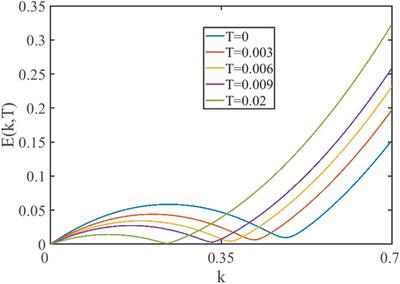当前位置:
X-MOL 学术
›
Ann. Phys. (Berlin)
›
论文详情
Our official English website, www.x-mol.net, welcomes your
feedback! (Note: you will need to create a separate account there.)
Effects of Thermally Induced Roton‐Like Excitation on the Superfluid Density of a Quasi‐2D Dipolar Bose Condensed Gas
Annalen Der Physik ( IF 2.2 ) Pub Date : 2020-05-07 , DOI: 10.1002/andp.201900412 Heshmatollah Yavari 1 , Forouzan Forouharmanesh 1
Annalen Der Physik ( IF 2.2 ) Pub Date : 2020-05-07 , DOI: 10.1002/andp.201900412 Heshmatollah Yavari 1 , Forouzan Forouharmanesh 1
Affiliation

|
Using the Green's function approach, the density–density correlation function and the dielectric function in the random‐phase approximation for a quasi‐two‐dimensional (quasi‐2D) dipolar Bose gas are derived. From the pole of the density correlation function, by considering thermally induced roton‐like excitations, the excitation spectrum of the system is calculated. It is shown that the position and depth of the roton minimum of the excitation spectrum are tunable by changing the temperature. To show how the position of the roton minimum influences the phenomenon of superfluidity, the superfluid density of the system is obtained and it is shown that the interplay of the thermal rotonization, contact and dipole–dipole interaction (DDI) can affect the superfluid fraction of a quasi‐2D Bose gas. It is found that contact, DDI interactions, and thermally induced rotons enhance the fluctuations and reduce the superfluid density. In the absence of DDI and thermally induced rotons, the usual T3 dependence of superfluid density in 2D is obtained and the correction T4 term arises from DDI. It is shown that if the roton minimum is close to zero, the thermally induced rotons change the linear temperature dependence of the superfluid fraction, leading to a transition to nontrivial supersolid phase.
中文翻译:

热诱导类顿激发对准二维偶极玻色冷凝气体超流密度的影响
使用格林函数方法,推导了准二维(准二维)偶极玻色气体的随机相近似中的密度-密度相关函数和介电函数。从密度相关函数的极点,通过考虑热诱导的类似顿的激发,可以计算出系统的激发谱。结果表明,通过改变温度可以调节激发光谱最小鲁顿的位置和深度。为了显示the子最小位置如何影响超流现象,获得了系统的超流密度,并显示了热ro化,接触和偶极-偶极相互作用(DDI)的相互作用会影响超流现象。准2D玻色气体。发现联系人,DDI互动,热诱导的棒增强了波动并降低了超流体密度。在没有DDI和热感应棒的情况下,通常获得了2D中超流体密度的T 3依赖性,并且校正T 4项源自DDI。结果表明,如果鲁顿极小值接近于零,则热诱导的鲁顿会改变超流体部分的线性温度依赖性,从而导致转变为非平凡的超固相。
更新日期:2020-05-07
中文翻译:

热诱导类顿激发对准二维偶极玻色冷凝气体超流密度的影响
使用格林函数方法,推导了准二维(准二维)偶极玻色气体的随机相近似中的密度-密度相关函数和介电函数。从密度相关函数的极点,通过考虑热诱导的类似顿的激发,可以计算出系统的激发谱。结果表明,通过改变温度可以调节激发光谱最小鲁顿的位置和深度。为了显示the子最小位置如何影响超流现象,获得了系统的超流密度,并显示了热ro化,接触和偶极-偶极相互作用(DDI)的相互作用会影响超流现象。准2D玻色气体。发现联系人,DDI互动,热诱导的棒增强了波动并降低了超流体密度。在没有DDI和热感应棒的情况下,通常获得了2D中超流体密度的T 3依赖性,并且校正T 4项源自DDI。结果表明,如果鲁顿极小值接近于零,则热诱导的鲁顿会改变超流体部分的线性温度依赖性,从而导致转变为非平凡的超固相。











































 京公网安备 11010802027423号
京公网安备 11010802027423号